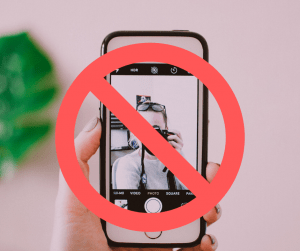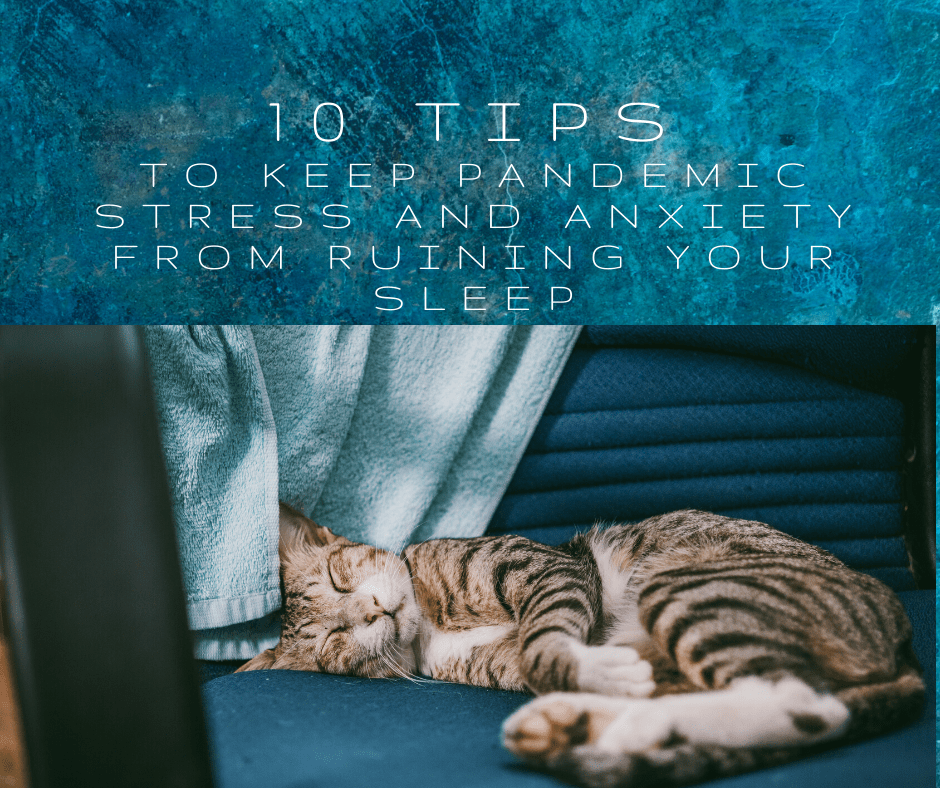10 Tips to keep pandemic stress and anxiety from ruining your sleep
I don’t know about you, but stress and worry keep me up at night (not to mention caffeine, action movies and late-night exercise like playing hockey until 11pm). The current world situation is, to say the least, a little overwhelming. Perhaps you or someone you now have contracted the novel coronavirus, or your employment/financial situation is being impacted by business closures and directives to stay home. Maybe you’re juggling caring for older relatives without physical contact, home schooling your children or trying to ward off cabin fever with 101 crafts and activities. It may be that you or your partner is a front-line worker and you worry about exposure to the virus or bringing it home to your family or you’re a lonely socialite climbing the walls missing your peeps. Regardless, this pandemic living isn’t easy.
I’m a creature of habit and I crave routine. Most of us do and this pandemic is disrupting everyone. This disruption in routine causes anxiety and stress which can exacerbate pre-existing mental health and insomnia problems, or cause new ones, according to Dr. Atul Khullar, an Edmonton psychiatrist and senior consultant for Medsleep clinics.
Sleep is critical to our emotional, mental and physical well being. We need sleep to boost our immune system and keep us healthy so it’s important to establish good sleeping habits. Here are 10 tips to help you sleep easier in this time of uncertainty:
- Turn your screens off an hour before bed
How many times have you heard this but not acted? Screens, be it from your phone, computer, tablet or tv blast blue-wave light which suppress melatonin, the hormone that regulates your sleep-wake activity and makes you tired at night. Sleep experts recommend shutting down your screens/devices an hour before you plan to go to bed.

2. Bedrooms are for sleeping
Related to the tip above, screens have no place in the bedroom according to the science. Now, some will argue it helps them to fall asleep to watch Netflix in bed, but studies show the quality of your sleep, and whether you sleep through the night are influenced by this activity. Further complicating things is that many people are having to work from home right now and sometimes the only quiet space is the bedroom. Just be sure to remove any aspect of work from the room before you retire for the night, even if it’s throwing a blanket over your computer and file stack. Other tips include keeping noise down (ear plugs, fan, closing door) and keeping the room cool and dark.
- Sunshine/Daylight is your friend
According to David Samson, an assistant professor at the University of Toronto who studies evolutionary links between sleep and cognition, just as we need to turn off blue-light-emitting devices before bed, we need to get blue-light-emitting sunshine during the day. He states, “This is critical to enhancing our circadian rhythms, and when we amplify our circadian rhythms, it’s basically cueing our body with the local environment.”
Now with physical distancing we seem to be inside more than ever. We need to get sunshine whenever/wherever we can so: step out onto the patio or balcony and enjoy your morning coffee; go for a walk (within current public health guidelines); open the blinds and set your home office up near a window; sit in the window to read your book; or consider eating lunch outside ( a private picnic in the backyard). When the evening comes and bedtime is approaching, use lower, warmer light to let your body know sleep time is approaching.

- Keep a sleep routine
Getting in sync with your body’s natural sleep-wake cycle, or circadian rhythm, is one of the most important strategies for sleeping better. If you keep a regular sleep-wake schedule, you’ll feel much more refreshed and energized than if you sleep the same number of hours at different times. Try and go to bed, and wake up, at the same time every day and avoid sleeping in (even on weekends).
- Exercise during the day
People who exercise regularly sleep better at night and feel less sleepy during the day. Exercise is also beneficial to our overall physical and mental well being. It’s not just for wearing out the dog these days, parents and kids need to “burn off” some energy too. We can still go for walks if we practice physical distancing. If you’re not able to get outside due to self-isolation, quarantine or other limiting factors, try a free exercise routine from the internet or an app (I use the ParticipACTION app), pull out an old video, or come up with your own routine.
- Time your naps
Napping is disruptive to your nighttime sleep, especially if you steal one after dinner. It’s best to limit naps to 20-30 minutes in the afternoon and avoid evening napping. Napping out of boredom will only compound problems with nighttime sleep so stay busy.
- Too much news is a bad thing
I’m a current events junkie but I have found I need to balance staying informed with staying sane. You need to look away from all the pandemic news. Pick one or two reliable news sources (not the questionable social media content your conspiracy theory uncle shares) and check them briefly, without reading every article/story. Try to avoid reading the news in the evening.
- Don’t watch the clock
If, unfortunately, you do wake up during the night, resist the temptation to check your phone or alarm clock for the time. Try and go back to sleep – I count backwards from 1000 by 13 (haven’t made it to zero yet). If that won’t work for you, get out of bed and try reading or some other low-level activity, and return to bed when you start to feel sleepy again.
- Think before you eat or drink
Daytime eating habits play a role in how well you sleep at night, especially as bedtime nears. Things to avoid/limit include caffeine (my cut off is noon); nicotine; alcohol; big meals (heavy, rich foods) within two hours of bedtime; sugary foods and refined carbs; and too much fluid intake in the evening.

- Clear your head
Consider creating a relaxing bedtime ritual to help you prepare your mind for sleep, such as practicing a relaxation technique, taking a warm bath, or dimming the lights and listening to soft music or an audio book. In the past month I have personally found deep breathing exercises and a selection from the Relax Melodies app to be very beneficial.
I hope this list has been helpful and assists you in getting a better night’s sleep during this time of uncertainty. Remember, we’re in this together. Sweet dreams.
https://www.participaction.com/en-ca/everything-better/sleep-better
